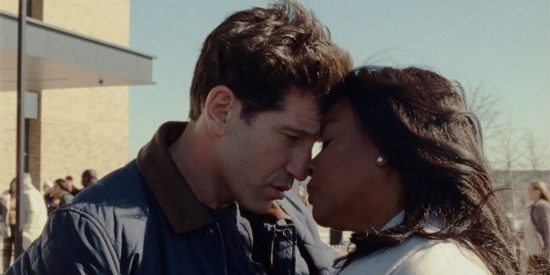TIFF 2023 Review: Origin – “Highly recommended.”

Jon Bernthal and Aunjanue Ellis-Taylor in ORIGIN. Courtesy of TIFF
In 2020 Pulitzer Prize winning writer Isabel Wilkerson released her latest book, Caste: The Origin of Our Discontent. It became a #1 New York Times Bestseller and stayed on the US bestsellers list for over a year. In that book, Wilkerson looks at the historical roots of discrimination in America and finds its basis within the caste system. She writes, “Caste is the infrastructure of our divisions. It is the architecture of human hierarchy, the subconscious code of instructions for maintaining, in our case, a 400-year-old social order.”
Filmmaker Ava DuVernay has herself looked at racial injustice and inequalities in some of her work, such as with her documentary 13th and 2014 feature Selma, both of which were nominated for Oscars. Adapting Wilkerson’s work, a monumental and ambitious task, allows her to look even deeper into a subject that has been a passion for her, for which her voice has already left a substantial mark in cinematic history. These two women are the perfect pairing to create the powerful, enlightening, and moving film that is Origin.
Instead of simply presenting Wilkerson’s writing in a documentary style that, arguably, might have been easier, DuVernay opts to present it as a narrative feature, which centres around the author’s journey. It starts when a colleague asks her to write about the death of Trayvon Martin, a young Black man who was murdered in 2012 as he innocently walked home from the store. DuVernay asks us to watch this act, to be horrified by it, to grieve this loss as, not only is it the truth, but it also is the seed from which Wilkerson starts to assemble her theory.
“I don’t write questions, I write answers,” she responds to that colleague, and Isabel Wilkerson (portrayed by a truly incredible Aunjanue Ellis-Taylor) doesn’t think that writing a piece on racism alone is that answer. She doesn’t see it as sufficient to explain everything that is happening, that we lean on that word without truly knowing its meaning anymore. Her husband Brett (Jon Bernthal in as sweet and tender a role as you’ve seen him) encourages her. Isabel wants to get to the heart of the issue yet is hesitant to begin.
However, once she experiences tragic loss in her life, Isabel starts on a journey that will take her around the globe. DuVernay follows Isabel in her travels, as she meets and interviews the people that will inform Wilkerson’s writing, piecing together the puzzle that is the root of dehumanization. It’s a journey that will see her discover the ‘connective tissue’ between caste systems everywhere; from Nazi Germany, to the untouchables in India, to the ‘unspoken race-based caste pyramid in the United States.’
Origin is borne of grief, both of Wilkerson’s personal loss and the atrocities that are part of all of our histories. But, through DuVernay’s lens, Origin uses the stories within, ones that Wilkerson discusses in her book, to make us truly see; to see with empathy, humanity, and love. Can Origin make you feel uncomfortable at times too? Absolutely, and it should. It directly confronts how we, as a society, directly take on the hierarchy passed down from our ancestors, how we have inherited the ‘broken old house’ and now can be the only ones to fix it.
The only way I can truly describe this film is to say it is a ‘narrative documentary’ – possibly an oxymoron, but it’s a hybrid that, again, DuVernay’s experience informs. Creating the story about Isabel Wilkerson’s journey in writing the book, allowing it to come to life with a protagonist leading the way, makes it more accessible. Not everyone is as attracted to feature documentaries truthfully. That said, Origin truly hits its stride once it starts to include voice-over work from Ellis-Taylor reading prose directly from Caste itself, as we can see the thesis that will become this important work start to fit together.
Origin is a lot to unpack. I took a lot of notes, and after seeing the movie I immediately started listening to the audiobook version of Wilkerson’s book to learn more. And if you’re not familiar with Caste, I highly recommend it – so far it’s riveting. It’s hard to rate something that as a film possibly has some shortcomings, and yet feels like it’s as important as any I’ve seen, that has ramifications for all of us. So I won’t. Surely not within the realm of a festival where you go from one film to another without proper time to contemplate and digest. That’s something Origin deserves. I look forward to revisiting the film when it’s released so I can do just that.
What DuVernay’s film certainly does is make Wilkerson’s work available to wider audiences and it invites conversation. In that way, it can only be deemed a success, and it comes highly recommended. As the film notes, “A world without caste would set everyone free,” but how we get there is on each of us. It’s on each of us to do the work, to cut through that connective tissue, and that starts with acknowledging it’s there in the first place.
Origin premiered at the Venice Film Festival September 6th, with its North American premiere at the Toronto International Film Festival September 11th. It will be scheduled for release sometime in late 2023 by Neon.









